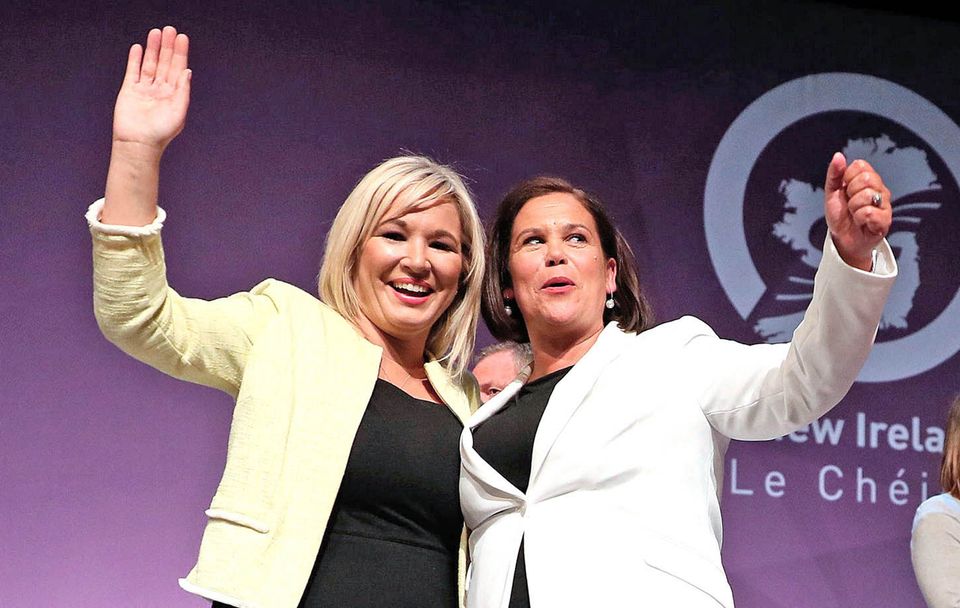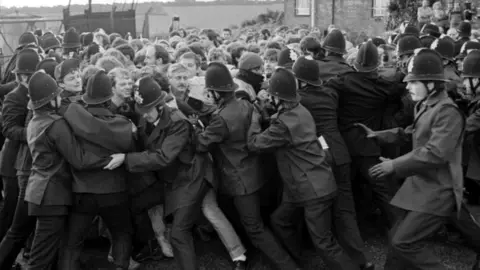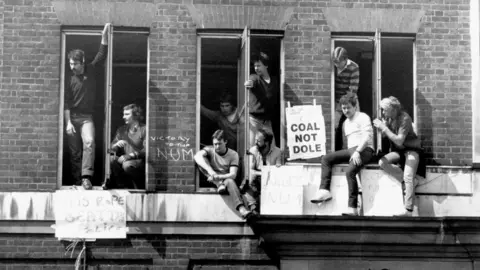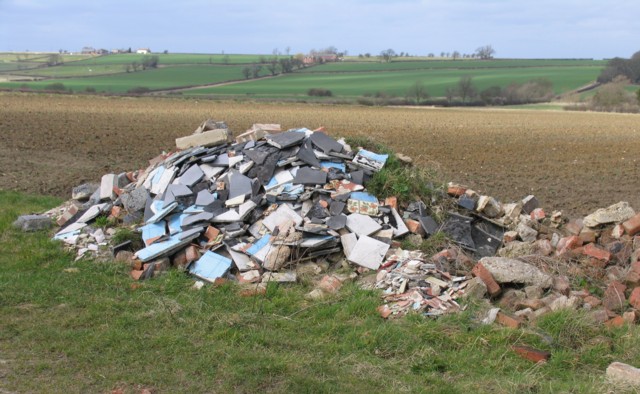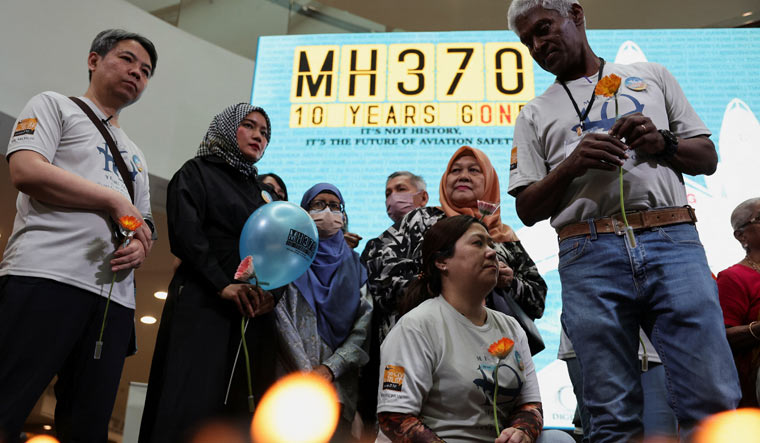'They wanted to humiliate us.' Palestinian women detained by Israel allege abuse in Israeli custody
JULIA FRANKEL
Fri, March 1, 2024

Nabela, who was detained by Israeli forces, poses for a portrait at the U.N. school where she is sheltering in Rafah, southern Gaza Strip, Friday, Feb. 23, 2024. Like many Palestinians in Gaza, Nabela thought she had found a safe place to shelter in a U.N. school. Then, the Israeli army arrived. She says soldiers stormed the school, ordering men to strip to their underwear and hauling women to a nearby mosque for strip searches. So began six harrowing weeks in Israeli custody that she says included repeated beatings and interrogations. (AP Photo/Fatima Shbair)More
JERUSALEM (AP) — Nabela thought the United Nations school in Gaza City was a safe haven. Then, the Israeli army arrived.
Soldiers stormed the place, ordering men to undress and hauling women to a mosque for strip searches, she said. So began six weeks in Israeli custody that she says included repeated beatings and interrogations.
“The soldiers were very harsh, they beat us and screamed at us in Hebrew,” said the 39-year-old from Gaza City, who spoke on condition that her last name not be used for fear of being arrested again. “If we raised our heads or uttered any words, they beat us on the head.”
Palestinians detained by Israeli forces in Gaza during the Israel-Hamas war have alleged widespread physical abuse and neglect. It's not known how many women or minors have been detained.
Nabela said she was shuttled between facilities inside Israel in a coed group before arriving at Damon Prison in the north, where she estimated there were at least 100 women.
Rights groups say Israel is “disappearing” Gaza Palestinians — detaining them without charge or trial and not disclosing to family or lawyers where they’re held. Israel’s prison service says all “basic rights required are fully applied by professionally trained prison guards.”
Israel declared war after Hamas-led militants killed about 1,200 people and took roughly 250 others hostage on Oct. 7.
Since then, ground troops have arrested hundreds of Palestinians to search for suspected militants and gather intelligence. Images of blindfolded men kneeling, heads bowed and hands bound, have sparked worldwide outrage. In northern Gaza and the southern city of Khan Younis, troops rounded up dozens at a time from U.N. schools and hospitals, including medical personnel.
The military said it makes detainees undress to search for explosives, bringing detainees into Israel before releasing them back into Gaza if they're deemed innocent.
For Nabela, that process took 47 harrowing days.
Despite Israeli evacuation orders, Nabela and her family had decided not to leave Gaza City, believing nowhere in Gaza was safe. Troops entered the school where they sheltered on Dec. 24.
“I was terrified, imagining they wanted to execute us and bury us there,” she said.
Forces separated Nabela from her 13-year-old daughter and 4-year-old son and loaded her onto a truck bound for a facility in southern Israel. According to the Israeli group Physicians for Human Rights-Israel, or PHRI, all detainees in Gaza are first brought to the Sde Teiman military base.
“We were freezing and forced to remain on our knees on the ground,” Nabela told The Associated Press from a school-turned-shelter in Rafah where she's staying with other recently released female detainees. “Loud music, shouting and intimidation — they wanted to humiliate us. We were handcuffed, blindfolded, and our feet were tied in chains.”
Moved between several prisons, Nabela said she was subjected to repeated strip searches and interrogations at gunpoint.
Asked about her connection to Hamas and knowledge of the militants’ extensive underground tunnel network, she maintained her innocence, telling interrogators she was a housewife and her husband worked for Hamas’ rival, the Palestinian Authority.
‘AN APPARATUS OF RETRIBUTION AND REVENGE’
One woman detained from Gaza, who spoke on condition of anonymity for fear of another arrest, told the AP that during a medical check before she was moved to Damon Prison, Israeli forces ordered her to kiss an Israeli flag. When she refused, a soldier grabbed her by the hair, smashing her face into a wall, she said.
In a report by PHRI, former detainees from Gaza alleged similar mistreatment.
One, whose name was redacted, said he was urinated on by guards at Ketziot Prison in southern Israel, and witnessed strip searches where guards forced naked detainees to stand close to each other and inserted search devices into their buttocks.
PHRI described Israel’s prisons, also housing Palestinians from the West Bank and east Jerusalem held on security-related charges, as “an apparatus of retribution and revenge." It alleged the prison service and military “have been granted free rein to act however they see fit.”
At the beginning of the war, prisons entered “lockdown mode,” confining detainees to their cells for two weeks, the report said. Under wartime emergency measures, Israel's parliament in October suspended normal cell capacity requirements. Since then, inmates have slept on mattresses in overcrowded cells.
Phone privileges have been completely suspended, the report said. At some facilities, security wings were disconnected from electricity and water, plunging detainees into darkness for most of the day and rendering showers and sinks unusable.
During eight days at an unknown facility in southern Israel, Nabela said she did not shower and had no access to menstrual pads or toiletries. Food was scarce. Once, Nabela said, guards threw down the detainees' meals and told them to eat from the floor.
The military said each detainee receives clothing, blankets and a mattress. It denied that cells were overcrowded, saying detainees had sufficient access to toilets, food, water and medical care.
“The violent and antagonistic treatment of detainees described in the allegations is prohibited," the military said in response to an AP request for comment. “Cases of inappropriate behavior will be dealt with.”
It referred questions about Ketziot and Damon prisons to the Israeli Prison Service, which did not comment on the allegations beyond saying it was uninvolved in the arrests and interrogation of Palestinians from Gaza.
‘UNLAWFUL COMBATANTS’
Nabela said she never spoke with a lawyer or a judge.
Under a wartime revision to Israeli law, all detainees from Gaza can be held for 45 days without charge or trial.
Designated “unlawful combatants,” they aren't granted the same protections under international law as prisoners of war. Their appearance before a court can be delayed and access to an attorney withdrawn, according to PHRI. The Israeli rights group HaMoked said there are 600 people from Gaza held as unlawful combatants in Israeli prisons, and more could be held in military facilities.
Palestinian detainees told PHRI that adequate medical care was rare, even for those needing insulin or chemotherapy treatments.
An official document obtained by the AP, laying out operations at the Sde Teiman military medical facility, specified that unlawful combatants be treated handcuffed and blindfolded.
Medical staff's names were kept anonymous “to maintain the safety, well-being and lives of the caregivers,” it said. It did not require patient consent for medical procedures and said confidential medical information could be passed to detention center staff.
The military said the handcuffing of detainees was “done in accordance with their assessed level of danger and medical state.” Israel’s Ministry of Health did not respond to requests for comment.
Eleven Palestinian detainees have died in Israeli custody since Oct. 7, according to the advocacy group the Palestinian Prisoners’ Club, and the most recent was just this week. At least five had chronic health conditions, which PHRI says raises concerns that they died because of medical neglect.
The Israeli military said it would examine the deaths.
‘BETTER THAN GAZA’
Nabela’s fortunes improved when she arrived at Damon. There, she met Palestinian women detained from the West Bank.
She said the women were kind. She had electricity and warm showers. Her interrogator wondered aloud why Nabela was detained.
A month and a half after her arrest, a prison administrator announced Nabela would be released with about 20 other women. Israeli buses brought them to a Gaza crossing, where they made their way to U.N. shelters in the southern city of Rafah, full of displaced Palestinians. She cannot travel to Gaza City, where her family remains.
Nabela, her face bruised, recalled one of her final interrogations. She had begun to weep, and her interrogator told her:
“Don’t cry about it. You’re better living here than Gaza.”
Israeli protest march demands hostage release 'now'
Robbie Corey-Boulet
Sat, March 2, 2024

The Israeli government faces mounting calls to bring home the remaining captives held in Gaza (GIL COHEN-MAGEN)
Thousands of Israeli demonstrators thronged a Jerusalem square on Saturday, concluding a four-day march from the Gaza border intended to pressure the government to free hostages held in the Palestinian territory.
Prime Minister Benjamin Netanyahu's government has faced mounting calls to bring home the 130 captives Israel says remain in the Gaza Strip -- including 31 who are presumed dead.
They are among the 250 Israelis and foreigners abducted during Hamas's October 7 attack that triggered the ongoing war.
The unprecedented attack on southern Israel also resulted in the deaths of around 1,160 people, mostly civilians, according to an AFP tally of official figures.
In almost five months of war since then, at least 30,320 people, mostly women and children, have been killed in Gaza, according to the Hamas-ruled territory's health ministry.
Protesters in Jerusalem waved flags and raised posters with the hostages' pictures or slogans calling for their release.
Organisers said 20,000 people participated in either the march or Saturday's rally.
"Now, now, all of them now," the crowd chanted during the rally which also featured prayers, songs and remarks from relatives.
"I was scared because I thought people are starting to forget or starting to get indifferent" about the captives' fate, said 50-year-old protester Daphna Keidar.
"But this is different" from past rallies, she said. "This is bigger."
As the rally was underway in Jerusalem, a senior US official said a truce deal which may see hostages freed could be within reach.
Mediators have scrambled to lock in a new truce before the Muslim fasting month of Ramadan begins later this month.
The US official, speaking on condition of anonymity, said on Saturday that Israel had "more or less accepted" a ceasefire deal and that "the ball is in the camp of Hamas".
Also on Saturday, thousands of anti-government protesters gathered in Tel Aviv to call for early elections.
In Jerusalem, a relative of one of the hostages still in Gaza said he hoped the rally would signal to officials that freeing the hostages must be their top priority.
"They must seal this deal no matter what," said Eyal Kalderon, cousin of hostage Ofer Kalderon.
"I don't know if they will have another chance. It's now or maybe never."
Reut Diamant, a 53-year-old demonstrator, told AFP that all Israelis "should be marching and should be coming to these events in order to show how important it is".
"I don't know anyone personally" who was abducted, she said.
"But it could have happened to my kids who are in the army, or to anyone else that I know."
Pressure mounts for inquiry into Israeli troops firing on Gazans waiting for aid
Updated Fri, March 1, 2024
By John Irish and James Mackenzie
PARIS/JERUSALEM (Reuters) -Pressure mounted on Israel on Friday over the deaths of dozens of Palestinians during a confused incident in the Gaza Strip in which crowds surrounded a convoy of aid trucks and soldiers opened fire, with several countries backing a U.N. call for an inquiry.
Gaza health authorities said Israeli forces had killed more than 100 people trying to reach a relief convoy near Gaza City early on Thursday, with famine looming nearly five months into the war that began with a Hamas attack on Israel on Oct. 7.
Israel blamed most of the deaths on crowds that swarmed around aid trucks, saying victims had been trampled or run over. An Israeli official also said troops had "in a limited response" later fired on crowds they felt had posed a threat.
Although the accounts of what happened differed sharply, the incident has underscored the collapse of orderly aid deliveries in areas of Gaza occupied by Israeli forces, with no administration in place and the main U.N. agency UNRWA hamstrung by an inquiry into alleged links with Hamas.
"We've asked the government of Israel to investigate, and it's our assessment that they're taking this seriously," U.S. national security spokesperson John Kirby told reporters on Friday.
"They are looking into what occurred, so as to avoid tragedies like this from happening again." He said the Biden administration trusted Israel to complete its own investigation, adding that "we don't have enough information" to verify its account of what happened.
The Hamas attack on Oct. 7 killed 1,200 people, mostly civilians, and involved the seizure of 253 hostages, according to Israeli tallies.
Israel's military campaign has since killed more than 30,000 Palestinians in Gaza, health authorities in the Hamas-run enclave say.
With a humanitarian catastrophe unfolding in Gaza, many countries have urged a ceasefire, but U.S. President Joe Biden said Thursday's incident will complicate talks for a deal involving a truce and hostage release.
India said it was "deeply shocked" at the deaths and Brazil said the incident was beyond "ethical or legal limits."
South Africa, which has brought a genocide case against Israel at the International Court of Justice, condemned the deaths. Israel denies genocide.
France and Germany have backed a call for an international inquiry. French President Emmanuel Macron voiced "deep indignation" and the "strongest condemnation of these shootings". Germany said "the Israeli army must fully explain how the mass panic and shooting could have happened."
In Israel, ultra-rightwing security minister Itamar Ben-Gvir urged "total support" to Israeli soldiers who had "acted excellently against a Gazan mob that tried to harm them".
A columnist in the biggest daily newspaper Yedioth Ahronoth said the incident would "create a turning point in the war" and could "exert international pressure that Israel will not be able to withstand, including from the White House."
AID DELIVERY ROW
A humanitarian disaster is unfolding in the Gaza Strip, particularly the north, after nearly five months of an Israeli air and ground campaign that has ruined swathes of the crowded coastal enclave and pushed it to the edge of famine.
British Foreign Secretary David Cameron, who also called for an inquiry, said Israel had a responsibility to ensure more aid reached Gaza by opening more crossings and removing bottlenecks and bureaucratic obstacles.
"This must not happen again," he said in a statement. "We can't separate what happened yesterday from the inadequate aid supplies."
With people eating animal feed and even cactuses to survive, and with medics saying children are dying in hospitals from malnutrition and dehydration, the U.N. has said it faces "overwhelming obstacles" getting in aid.
The U.N. humanitarian agency OCHA said obstacles included "crossing closures, restrictions on movement and communications, onerous vetting procedures, unrest, damaged roads and unexploded ordnance."
Last week the U.N. said aid flows into Gaza were drying up and it was becoming increasingly hard to distribute aid within the enclave because of a collapse in security, with most residents hemmed into makeshift camps.
Israel has said there is no limit on humanitarian aid in Gaza and has said the quantity and pace of delivery was down to the U.N.
Israel's military said Thursday's delivery was operated by private contractors as part of an aid operation it had been overseeing. It gave no details on how the aid was intended to be distributed.
(Reporting by John Irish in Paris, James Mackenzie in Jerusalem, Rachel More in Berlin, Gabrielle Tetrault-Farber in Geneva, Angus McDowall, James Davey in London and Nandita Bose in Washington; Editing by Angus MacSwan and Rosalba O'Brien)
